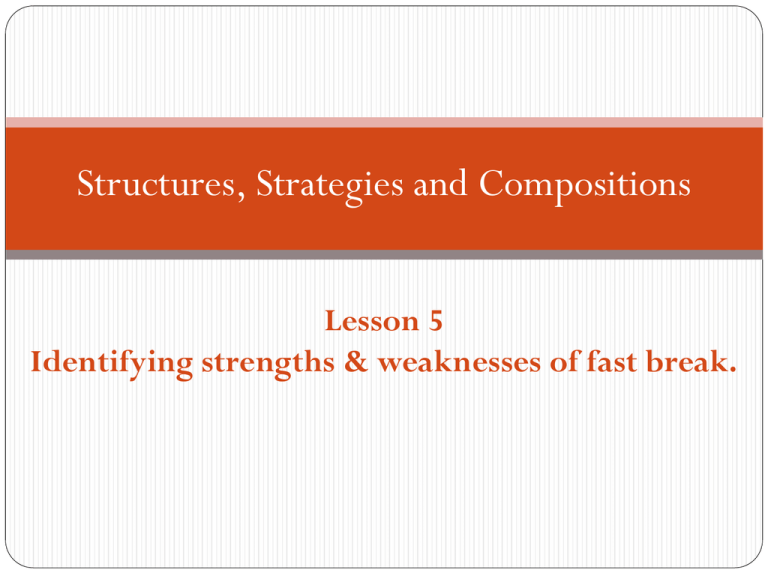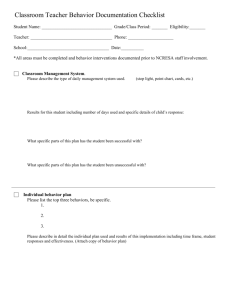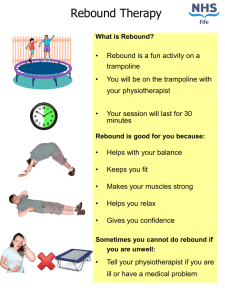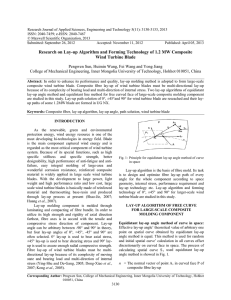Structures, Strategies and Compositions
advertisement

Structures, Strategies and Compositions Lesson 5 Identifying strengths & weaknesses of fast break. Today we will... • Homework feedback • Review Model Answer • Gathering data on your role/best position • Gathering data on teams performance of fast break • Consider whether the method of data collection we used was appropriate • Analyse the data collected to identify strengths & weaknesses of our fast break. • Investigate how a weakness may affect our fast break • Issue homework for Thursday 8th March (click here to see homework) Homework feedback Homework codes used in PE Excellent of the standard expected Satisfactory, some key content / information missing Unsatisfactory, not of the level required – REDO Homework feedback – Review Model Answer Question One Click to view Model Answer Describe how you identified the role/position you were most suited to in an activity of your choice. (in other words, describe how you identified what position you should play in basketball). Example structure for above question (copy into jotter) Videoed recorded playing in a competitive 10 minute game. Using video completed a role effectiveness (click here to view) observation schedule. Observation schedule assessed key basketball skills: Rebound Passing Dribbling Shooting – Jump/Set/Lay-up lay-up. Every time one of the skills was attempted we filled in the observation schedule by placing a tick or cross depending if the skill was successful or unsuccessful.. Homework feedback – Review Model Answer Question Two Click to view Model Answer Name a structure, strategy or composition you have used in an activity of your choice. Describe how you gathered data on your chosen structure, strategy or composition. (in other words describe how you gathered data on your fast break). Example structure for above question (copy into jotter) Videoed recorded playing in a competitive 10 minute game. Using video completed a fast break observation schedule (click here to view). Observation schedule broke our attack down into small parts: Rebound outlet pass dribbles down the middle Pass lay-up. Every time a Fast Break was attempted we filled in the observation schedule by placing a tick beside the parts of the attack that were successful. If a part of the attack was unsuccessful we placed a cross next to it and put a comment to say why it was unsuccessful. If we missed something on the video we rewound the tape and watched it again. Was method of data collection appropriate? (completed last week) Task Justify why each of the points below are appropriate for gathering data on your fast break. 10 minute game? Video record? Opponents of similar ability? Breaking fast break down into small parts? Placing a tick beside the parts of the attack that were successful, placing a cross next to the parts that were unsuccessful? Putting a comment to say why something was unsuccessful? Why was this method appropriate? Task: Using the key content below mark your partners answers to the previous task Why method of data collection is appropriate 10 minute game is an appropriate length to demonstrate our strengths and weaknesses. We should perform a number of fast breaks in 10 minutes, enabling us to get a true picture, not a one off. Videoing our performance let us watch over the performance as many times as we wanted. This made our data gathering more accurate. Also basketball is a fast paced activity, videoing allowed us to pause / rewind / watch in slow motion to ensure we didn’t miss anything. Opponents of a similar ability ensured the game was competitive but fair, giving a true picture. Not to challenging, or to easy that we over power opponents. Breaking our fast break down into it’s component parts enabled us to see exactly where fast break broke down. Placing a or meant it was easy to read and understand the data Writing a comment gave us specific feedback on why the attack broke down. Just putting across is not enough detail. For example was it a bad pass, did opponent intercept, did player receiving the pass make a mistake. Video and observation schedule are permanent records of our performance that can be looked at again and compare with later tests. Analysing data – Strengths & Weaknesses How many times did your team attempt a fast break? How many of those fast breaks were successful? How many of the fast breaks were unsuccessful? How many times was each part successful or unsuccessful Component part Number of times Successful Number of times Unsuccessful Defensive Rebound Outlet pass Dribble down the middle All 3 lanes filled Pass to shooter Lay-up Which parts were most successful? Which parts were least successful? Read the comment box, what was the most common reason for the fast break to break down? Strengths & Weaknesses of the Fast Break Task One • In your jotter brain storm possible strengths and weaknesses Predictable Speed Width Poor passing Opposition centre better than our centre Pressure on individual skill levels Task Two • Explain how each of the above weaknesses would affect your performance. Weaknesses of the Fast Break Predictable – opposition know what’s going to happen Speed – can’t dribble up court fast enough so defence get back Width - Don’t fill all three lanes so any defender who get back can mark up Poor passing - Interceptions common so we loose possession Opposition centre better than our centre – Can’t win rebound, can’t start fast break Pressure on individual skill levels – player not skilful enough, mistakes made, loose possession, fouls made, have to slow down Homework Due Thursday 8th March (Must be signed) Question One Name two weakness that you discovered in your teams performance of the fast break. Question Two Explain the affect each weakness had on your performance












